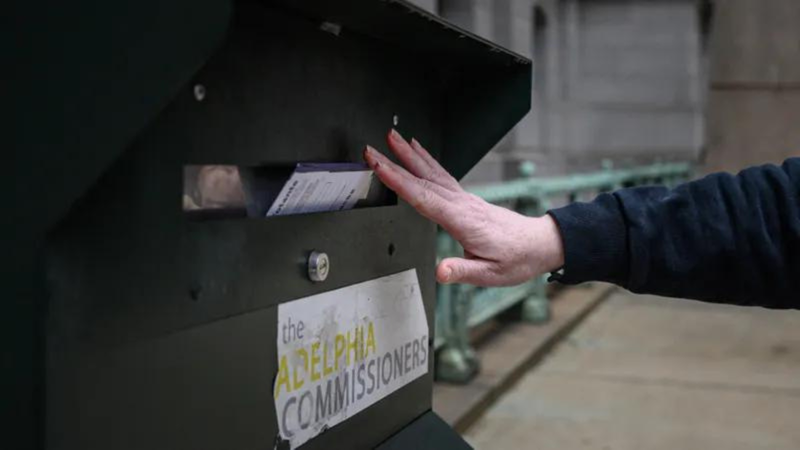
PHILADELPHIA (KYW Newsradio) — The Commonwealth Court ruled 4-1 Friday that election officials in Pennsylvania cannot reject a mail-in ballot because of a faulty date on the return envelope.
State law says voters must sign and date mail-in ballot envelopes. But thousands of voters who forgot the date or wrote the wrong one were disenfranchised when their ballots were tossed as a result.
The Commonwealth Court says that violates the state constitution’s free and equal election clause. It ordered Philadelphia and Allegheny County — the named defendants in the suit — to stop enforcing the dating provision. But Ben Geffen of the Public Interest Law Center, who represented the voting rights advocates that brought the case, believes it is applicable through the state.
“Pennsylvania is the birthplace of modern democracy,” Geffen said. “We have a long tradition of free and equal elections. Today’s decision adds to that legacy.”
Though Omar Sabir, city commissioner of Philadelphia, technically lost the case, he is very pleased with the outcome.
“It’s great. I mean, this is a start but the legislature needs to do more to make voting accessible,” Sabir said.
Sabir says voters should still be very careful to read and follow mail-in ballot rules and get them in early so the election board can notify them if they’ve made any mistakes.
The number of mail-in ballots that might otherwise be disqualified for lacking accurate exterior envelope dates is comparatively small in a state where more than 6 million votes will be cast this fall, perhaps exceeding 10,000.
Evidence in litigation surrounding the requirement has indicated older voters have been more likely to have their ballots thrown out for lack of an accurate handwritten date. Far more Democrats than Republicans vote by mail in Pennsylvania.
'A wholesale abandonment'
In a lone dissent, Judge Patricia McCullough said the majority showed “a wholesale abandonment of common sense,” ignoring more than a century of legal precedent and rewriting the 2019 state law that dramatically expanded mail-in voting.
“I must wonder whether walking into a polling place, signing your name, licking an envelope, or going to the mailbox can now withstand the majority's newly minted standard,” McCullough wrote.
The office of Secretary of State Al Schmidt, appointed by Gov. Josh Shapiro, had no immediate comment about how the decision might alter its guidance to counties that run elections. In July, the Department of State told counties that return envelopes should be printed so they already include the full year, “2024,” leaving voters to add the accurate month and day.
“Multiple court cases have now confirmed that the dating of a mail-in ballot envelope, when election officials can already confirm it was sent and received within the legal voting window, provides no purpose to election administration,” the Department of State said in a release.
Tom King, a lawyer who represents the state and national Republican Party groups in the case, said he was disappointed in the decision and “absolutely will appeal.” They had argued the Pennsylvania Supreme Court had “already rejected similar arguments regarding the constitutionality of and the meaningless underlying the dating provisions" in prior cases regarding envelope dates, Ceisler wrote.
A statement released on behalf of Republican Party of Pennsylvania Chairman, Lawrence Tabas said this court order changes a “long-standing law and the rules for voting in Pennsylvania — with less than 70 days before this November’s election — and we will appeal.”
“Recently, both the PA State Supreme Court and a Federal appeals court were rightly deferential to Pennsylvania law and to the legislature’s authority," the statement continued. "Both upheld the well-settled existing law, which requires Pennsylvania mail-in ballots to be dated in order to be counted. Decisions like the one that came today from the Commonwealth Court, that change the rules on the eve of an election, contribute to public perception that the judiciary is becoming more political and more willing to encroach on legislative authority."
The plaintiffs include the Black Political Empowerment Project, POWER Interfaith, Make the Road Pennsylvania, OnePA Activists United, New PA Project Education Fund, Casa San José, Pittsburgh United, League of Women Voters of Pennsylvania and Common Cause Pennsylvania.
They argued that county elections officials are able to tell whether ballots were cast in time because they are scanned and timestamped upon arrival.
The ACLU of Pennsylvania, which helped represent the plaintiffs, hailed the decision as a win for voters and democracy.
“No one should lose their vote over a simple human error that has no relevance to whether or not the ballot was received on time,” said Mike Lee, the group’s executive director, in an emailed statement.
The Committee of Seventy says every voter should feel confident casting their ballot by mail, knowing that minor mistakes will not keep them from making their voice heard.
“We have always maintained that the requirement to date the mail-in ballot envelope is unnecessary and we are glad to see today’s Commonwealth Court decision confirm that long-standing belief."
